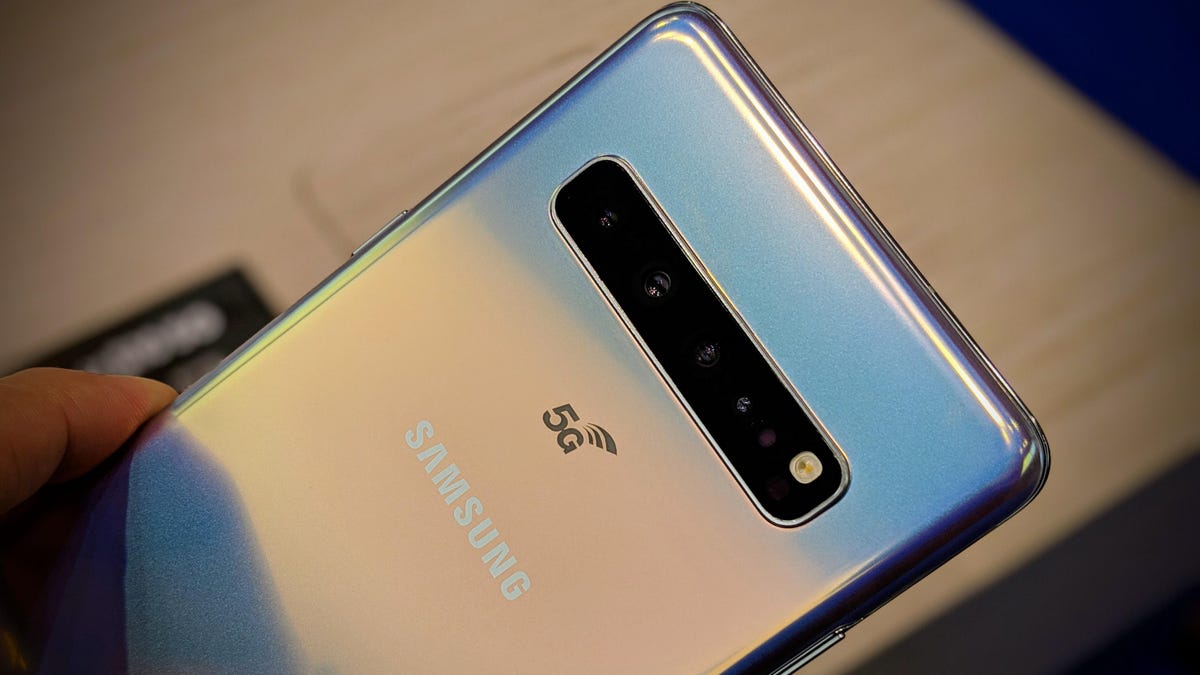5G will rule on high-end phones by year's end, ready or not
Qualcomm's president predicts flagship smartphones will move to 5G quickly -- but in emerging markets phones will still only run on older networks.

The Galaxy S10 5G is Samsung's first phone running on the new, super-fast wireless network.
If you're planning to buy a phone later this year, you may not be able to avoid 5G .
Qualcomm President Cristiano Amon last week predicted that by this holiday season or the Chinese New Year in early 2020, all major flagship phones will run 5G -- and there may not even be an option to buy a high-end device without the new, super-fast connectivity.
"You're going to see that for the 5G markets, if most of the carriers are rolling out 5G in those markets, you're only going to have 5G flagships," Amon said in an interview last week at Mobile World Congress in Barcelona.
That differs from the strategy of the first crop of 5G phones arriving early this year. Most companies are offering one version of their flagship phones that run on the faster network, as well as other variants that only tap into 4G LTE and older networks. Samsung's Galaxy S10 5G is basically its 4G LTE-enabled Galaxy 10 Plus on steroids. And Xiaomi's Mi Mix 3 5G is essentially the company's 4G LTE Mi Mix 3 phone with an added 5G chip.
5G has long been touted as a game-changing technology, with the ability to dramatically boost the speed, coverage and responsiveness of wireless networks. It can run between 10 and 100 times faster than your typical cellular connection today, and even quicker than anything you can get with a physical fiber-optic cable going into your house. But 5G's rollout is just getting started. The first devices haven't gone on sale yet, and most carriers haven't turned on their 5G networks.
Most smartphone shoppers early this year likely will still opt for the 4G variants. But if you plan to hold onto your phone for two or three years, which is now typical of most buyers, you may want to spring for the 5G model from your preferred vendor.
5G's rollout
Nearly all big Android handset makers will jump into 5G early this year. Essentially all of them, except for Huawei , will use Qualcomm's 5G modems. Amon in December predicted that every major Android handset vendor will offer a 5G flagship phone by the holidays of 2019.
Samsung, the world's biggest smartphone vendor, unveiled its first 5G phone ahead of MWC during its Unpacked event in San Francisco, and Oppo last week talked up its first, not-yet-named 5G phone. Huawei showed off its 5G Mate X foldable at MWC, and Xiaomi detailed its Mi Mix 3 5G. MWC also marked the debut of LG's V50 and ZTE's Axon 10 Pro, and Sony and OnePlus showed off prototypes for devices they'll launch this year.
The initial devices won't have many places to actually connect to the fast networks, at least not in early 2019. Carriers like AT&T and Verizon are just starting to turn on their 5G networks, which will first be in pockets of cities like Dallas. Even if the carriers say they have 5G coverage in a city, you may struggle to actually get on the network, even with a compatible device.
But 5G is coming faster than 4G, Qualcomm's Amon said.
"If you look at the US, by the second half of 2019 and the holiday season, all carriers will have 5G," he said.
Emerging markets' slower rollout
5G is coming slower in emerging markets than in places like the US. In those areas, handset makers will still have 4G versions of their flagships, along with offering a 5G variant through 2019 and early 2020, Amon said.
"The intersection point where 4G starts to disappear globally from the flagship is probably in the second half of 2020," he predicted.
That's likely the same time Apple will have its first 5G phone. The company previously relied on Qualcomm for the wireless chips for its devices, but it's worked with Intel over the past couple of years because of a patent licensing battle with Qualcomm. Intel's 5G modem won't be in phones until 2020, it said.
MediaTek, another company Apple reportedly has talked to about 5G chips, also won't have its modems in 5G phones until next year, Yenchi Lee, senior director of product marketing for MediaTek's wireless communications business, said last week in an interview at MWC. Its initial 5G modem customers will launch their devices in China, he said.
Lee noted that while people will buy their first 5G smartphones this year, there's still not a clear benefit for the buyers.
"Even if they have a 5G device, so what?" he said. "It will take some time for the market and applications for the ecosystem to really benefit from what 5G can bring to the end users."
The hope is that time is 2020.

